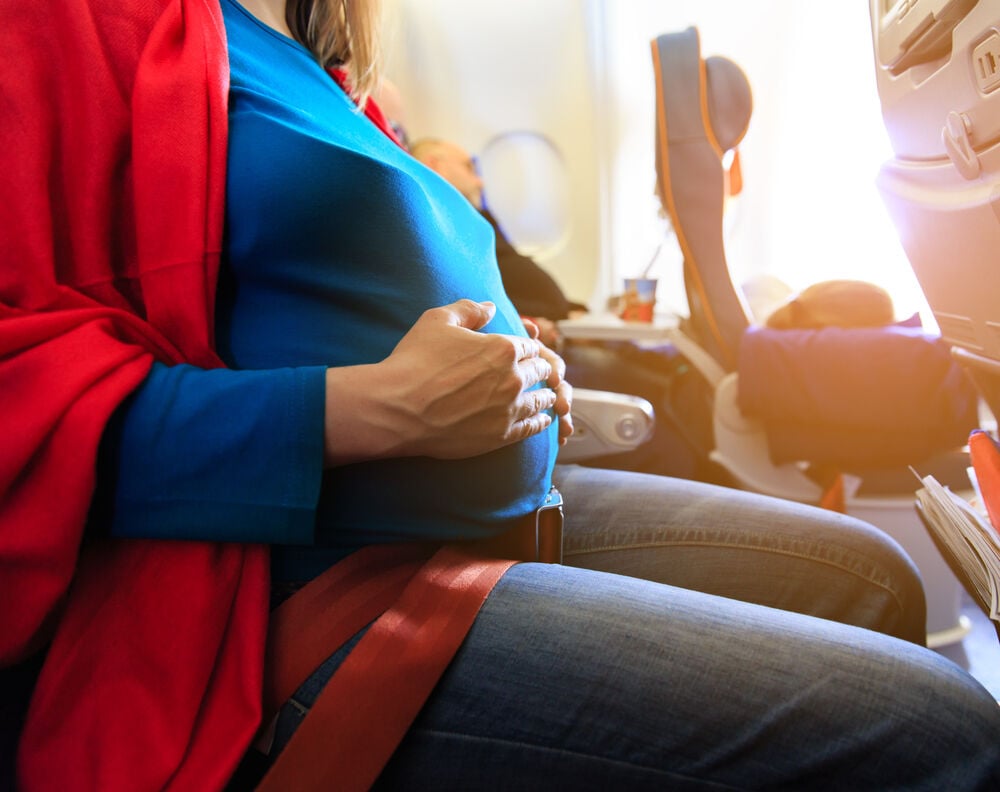-
Tracking cycle
-
Getting pregnant
-
Pregnancy
-
Help Center
-
Flo for Partners
-
Anonymous Mode
-
Flo app reviews
-
Flo Premium New
-
Secret Chats New
-
Symptom Checker New
-
Your cycle
-
Health 360°
-
Getting pregnant
-
Pregnancy
-
Being a mom
-
LGBTQ+
-
Quizzes
-
Ovulation calculator
-
hCG calculator
-
Pregnancy test calculator
-
Menstrual cycle calculator
-
Period calculator
-
Implantation calculator
-
Pregnancy weeks to months calculator
-
Pregnancy due date calculator
-
IVF and FET due date calculator
-
Due date calculator by ultrasound
-
Medical Affairs
-
Science & Research
-
Pass It On Project New
-
Privacy Portal
-
Press Center
-
Flo Accuracy
-
Careers
-
Contact Us
Flying While Pregnant: Tips to Enjoy Your Travel


Every piece of content at Flo Health adheres to the highest editorial standards for language, style, and medical accuracy. To learn what we do to deliver the best health and lifestyle insights to you, check out our content review principles.
Can pregnant women fly?
For most women, flying during pregnancy is perfectly fine through the third trimester. In fact, the ideal time to do it is between the 12th and 36th weeks of pregnancy – when there’s a decreased chance of complications. If you’re carrying twins, though, the safest time to fly is prior to week 32.
Some airlines set their own limitations on when pregnant woman can fly, while others request an advance medical report. So be sure to research this when booking a vacation.
It’s also crucial to consult your doctor for guidance regarding any health issues, including:
- Diabetes
- High blood pressure
- Spotting
- Previous early births
- Past miscarriages
- Severe morning sickness
In the absence of such problems, you’re officially cleared for takeoff!
Flying during first trimester of pregnancy
Believe it or not, pregnancy and flying go hand in hand during your first trimester. It’s actually thought of as a low-risk period for flying while pregnant. According to the American College of Obstetricians and Gynecologists, noise vibration, cosmic radiation, and cabin pressure do not pose a significant risk to pregnant women. This is also true of airport metal detectors, but if you’d prefer, you can certainly opt for a manual search.
Flying during second trimester of pregnancy
You’ve probably heard from family and friends that the second trimester is the best time for flying during pregnancy. This in-between period tends to be easiest on moms-to-be. You’re not battling the nausea and fatigue of the first trimester or feeling as clumsy and uncomfortable as in the third trimester. Your energy level’s up, and you look and feel great. This is why many expectant couples decide to take their “babymoon” during the second trimester.
Though it’s unlikely, think about familiarizing yourself with your travel destination to ensure there’ll be access to medical services in an emergency.
How late in pregnancy can you fly?

Pregnancy is simply a natural biological process which lasts approximately 9 to 10 months. If everything’s going according to plan, you shouldn’t have to cancel your trip and confine yourself to the house.
However, flying when pregnant, especially during the third trimester, is a bit more complicated. After entering your 37th week, there’s always a possibility that you could go into labor.
The majority of airlines will not allow pregnant women to fly past week 36. Some carriers even require a doctor’s letter once you’ve passed the 28-week mark. It should include your due date and state that your pregnancy is normal and healthy. Remember to keep this letter with you at all times while traveling to avoid any hassles.
Take a quiz
Find out what you can do with our Health Assistant
10 safety tips for flying while pregnant
Next, we’ll review recommended guidelines for having a safe and comfortable journey.
Before the flight
- Schedule a consultation with your doctor prior to flying during pregnancy. They can advise you of potential risk factors and determine whether you’ll need any vaccinations based on your destination. Ask them how to pack a first aid kit suitable for your stage of pregnancy and specific medical issues.
- Healthcare professionals strongly advise against traveling to regions affected by Zika. The illness is spread through mosquito bites and has been known to cause serious birth defects. Take the time to discuss with your provider which countries are safe to visit while pregnant.
- Every major airline has its own set of rules and procedures regarding pregnant women traveling. Put a little time and effort into researching these restrictions prior to booking or paying for your vacation.
- Double-check the coverage and fine print on your travel and health insurance policies. You’ll want to make sure you’ve got all your bases covered in the event of an early delivery.
During the flight
- Flying while pregnant can increase your chances of developing deep vein thrombosis (DVT). Experts suggest getting out of your seat and walking the length of the plane every hour to improve blood circulation. Also consider wearing compression socks to prevent swelling and blood clots, as well as achiness and fatigue.
- If stretching regularly isn’t an option, try occasionally pumping your legs. Point your toes downward, then point your toes upward. Do 10 repetitions per hour throughout the course of the flight.
- Drink plenty of fluids to avoid dehydration.
- Always check to see if your seatbelt is properly fastened. The buckle should sit just below your belly, with the strap resting low on your hips.
- Wear loose-fitting clothing and comfy shoes that you can easily slip on and off, as needed.
- If possible, book yourself an aisle seat since you’ll be moving around quite often.
Contrary to popular belief, flying while pregnant carries very few risks. Just remember to speak with your doctor and check for any airline restrictions before making reservations. As long as you take all the necessary precautions outlined above, the sky’s the limit!


Hey, I'm Anique
I started using Flo app to track my period and ovulation because we wanted to have a baby.


The Flo app helped me learn about my body and spot ovulation signs during our conception journey.


I vividly
remember the day
that we switched
Flo into
Pregnancy Mode — it was
such a special
moment.
Real stories, real results
Learn how the Flo app became an amazing cheerleader for us on our conception journey.
References
History of updates
Current version (10 July 2019)
Published (10 July 2019)
In this article

Get your personal guide to pregnancy with the Flo app
-
Follow your baby's growth week by week
-
Get expert info on symptoms, safe foods, and more
-
Chat with other parents-to-be




